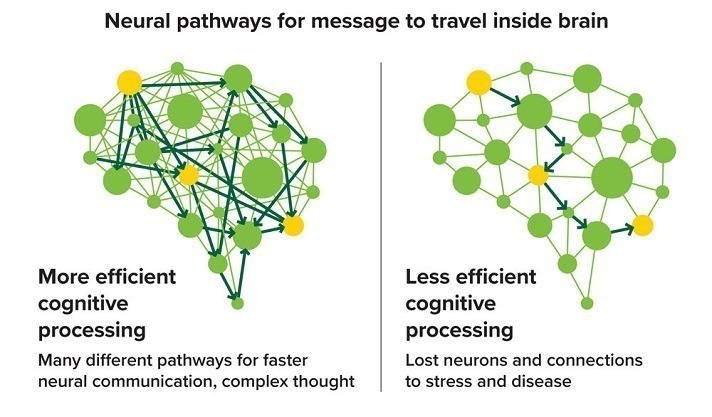Study: Building cognitive reserve helps delay memory and thinking decline regardless of genetic or childhood markers

Source: UAB researcher David Vance
Building cognitive reserve could protect against memory and thinking decline, even with low childhood cognition scores (Alzheimer’s Research UK):
New research suggests that people who develop high ‘cognitive reserve’ by the time they reach 69 years old may reduce their likelihood of memory and thinking decline, even with low childhood cognitive abilities. The study was published today in Neurology, the medical journal of the American Academy of Neurology.
Worsening memory and thinking abilities are common in people living with dementia, which is caused by physical diseases in the brain that damage nerve cells and the connections between them. Some people seem to be more resilient to this damage than others. This resilience is known as cognitive reserve and research suggests that education, mental stimulation and healthy living could help to boost it.…
The participants were part of the 1946 birth cohort, the oldest British birth cohort where people were monitored throughout their lives. This is the same cohort behind the Insight 46 study, funded by Alzheimer’s Research UK … The team had access to the participants’ childhood cognitive test scores as well as their educational and occupational history. They also knew the participants’ lifestyle habits, hobbies, and leisure activities.
“While our childhood can influence our memory and thinking skills later in life, this research underlines the message that it’s never too late to take action to support cognitive health.” — Dr Sara Imarisio, Head of Strategic Initiatives at Alzheimer’s Research UK
The Study:
- Background and objectives: As the population ages, differences in cognitive abilities become more evident. We investigated key genetic and life course influences on cognitive state at age 69, building on previous work using the longitudinal MRC National Survey of Health and Development (the British 1946 birth cohort).
- Methods: Multivariable regressions investigated the association between four factors :(1) childhood cognition at age 8; (2) a cognitive reserve index (CRI) composed of 3 markers: i. educational attainment by age 26, ii. engagement in leisure activities at age 43, and iii. occupation up to age 53; (3) reading ability assessed by the National Adult Reading Test (NART) at age 53 and (4) APOE genotype in relation to cognitive state measured at age 69 with Addenbrooke’s Cognitive Examination third edition (ACE-III). We then investigated the modifying role of the CRI, NART, and APOE in the association between childhood cognition and the ACE-III.
- Results: The analytical sample was comprised of 1,184 participants. Higher scores in childhood cognition, CRI and NART were associated with higher scores in the ACE-III. We found that the CRI and NART modified the association between childhood cognition and the ACE-III: for 30 additional points in the CRI or 20 additional points in the NART, the simple slope of childhood cognition decreased by approximately 0.10 points … The association between childhood cognition and the ACE-III was non-significant at high levels of the CRI or NART. Furthermore, the e4 allele of the APOE gene was associated with lower scores in the ACE-III (ß=-0.71, 95% CI ‑1.36 to ‑0.06, p=0.03) but did not modify the association between childhood cognition and cognitive state in later life.
- Conclusion: The CRI and NART are independent measures of cognitive reserve since both modify the association between childhood cognition and cognitive state.


